-

新人教版高中英语必修2Unit 3 The Internet-Reading and Thinking教案二
Q5:What's Jan's next goal?Her next goal is to start a charity website to raise money for children in poor countries.Q6:What can we learn from her experiences?We learn that when we go through tough times, we can find help and support from other people online. We learn that we can feel less lonelyStep 5: While reading---rethinkingQ1: What is Jan’s attitude to the Internet ?Thankful/Grateful, because it has changed her and her life.Q2: What writing skills is used in the article ?Examples(Jan’s example, the 59-year-old man’s and the 61-year-old woman’s example)Q3: Can you get the main idea of the article ?The Internet has changed Jan’s life/Jan’s life has been changed by the Internet.Step 6 Post reading---Retell the storyMuch has been written about the wonders of the World Wide Web. There are countless articles (1)telling(tell) us how the Internet has made our lives more convenient. But the Internet has done a lot (2)more(much) for people than simply make life more convenient. People’s lives (3) have been changed(change) by online communities and social networks so far. Take Jan for example, who developed a serious illness that made her (4)stuck(stick) at home with only her computer to keep (5)her(she) company. She joined an online group (6)where she could share problems, support and advice with others. She considered the ability to remove the distance between people as one of the greatest (7)benefits(benefit). She was so inspired (8)that she started an IT club in which many people have been helped. She has started to learn more about how to use the Internet to make society better. Her next goal is to start a charity website to raise money (9)for children in poor countries. Jan’s life has been (10)greatly(great) improved by the Internet.

新人教版高中英语必修2Unit 4 History and Traditions-Discovering Useful Structure教案二
This teaching period mainly deals with grammar: The past participle is used as attributive and objective complement.1. Guide students to review the basic usages of the past participle used as attributive and objective complement.2. Lead students to learn to use some special cases concerning the past participle used as attributive and objective complement flexibly.3. Strengthen students’ great interest in grammar learning.1. Help students to appreciate the function of the past participle used as attributive and objective complement.2. Instruct students to write essays using the past participle used as attributive and objective complement.Step1:温故而知新。Analyze the underlined phrases and then sum up the common usages of the past participles.1.(教材P41)They had castles built(build) all around England, and made changes to the legal system.2.(教材P42)They use the same flag, known(know) as the Union Jack,...3.(教材P42)Judy and I had our car parked(park) in an underground car park near Trafalgar Square, where we could get our car battery charged(charge).Common points: f the past participle used as attributive and objective complement.Step 2:过去分词作定语时的意义1.及物动词的过去分词作定语,在语态上表示被动;在时间上,常表示动作已经发生或完成,有时也不表示时间性。Our teacher watched us doing the experiment and gave us a satisfied smile at last.我们的老师看着我们做实验,最后给了我们一个满意的微笑。The plan put forward at the meeting will be carried out soon.会上提出的计划将很快被执行。2.不及物动词的过去分词作定语,它不表示被动意义,只强调动作完成。Many little kids like gathering fallen leaves in the yard.

新人教版高中英语必修2Unit 4 History and Traditions-Reading and Thinking教案二
Step 5 While reading---Task 3Read the text again and answer the following questions.Q1: How many countries does the UK consist of ?4 Q2: What are the four countries of the United Kingdom?England, Wales, Scotland and Northern Ireland Q3: Which two were the first to be joined together ?England and WalesQ4: What are the two chief advantages of studying the history of a country ?The first one is to help you understand more about the country and its traditions.The second one is to make visiting it more enjoyable.Q5: What’s the author’s attitude towards studying the history ?Supportive/positiveStep 6 Post reading---Retell the textThe United Kingdom, Great Britain, Britain, England—many people are confused by (1)_____ these different names mean. In the 16th century, the nearby country of Wales (2) __________(join) to the Kingdom of England. In the 19 th century, the Kingdom of Ireland was added to create the United Kingdom of Great Britain and Ireland. Finally, the southern part of Ireland (3) ______ (break) away from the UK, which resulted in the full name we have today. However, most people just use the (4)_________(shorten) name: the UK. The four countries (5)__________ belong to the United Kingdom work together in some areas. There were four sets of invaders and the last group were the Normans. They had castles (6)_________(build) all around England and made changes (7)__________ the legal system. Studying the history of the country will make your visit much more (8)_________(enjoy). The capital city London is (9)___ ancient port city that has a history (10)______(date) back to Roman times. 1. what 2.was joined 3.broke 4.shortened 5.that 6. built 7.to 8.enjoyable 9.an 10.dating Step 6 Homework

新人教版高中英语必修2Unit 4 History and Traditions-Listening&Speaking&Talking教案二
Listening and Speaking introduces the topic of “Take part in a youth project”. The listening text is an interview about "sharing views on historical sites". Through listening to a dialogue between Chinese and foreign students on the way to the Confucius Temple, students can understand their views on the Confucius Temple, Confucius, Confucius' descendants and Confucius' educational thoughts, so as to realize and think about the profound influence of Confucius and his thoughts on Chinese historical tradition. At the same time, the dialogue naturally integrates English idioms and mentions Shakespeare, the British playwright, so as to provide language materials and context for students to understand English idioms and related cultural allusions, as well as to compare Chinese and foreign cultures, which is helpful for students to understand and express the language such as history, tradition, culture and custom significant impact.Text analysis: listening text is a dialogue between a British student and a Chinese student when he goes to the Confucius Temple. When William, a British student, visited the Confucius Temple, he asked Xiao Kong, a Chinese student, for directions. Xiao Kong was just going to the Confucius Temple to meet with the members of the research group, so they went together and exchanged their views on the Confucius Temple, Confucius, Confucius' descendants and Confucius' educational thoughts. From the perspective of foreign tourists, this paper describes their thoughts on Confucius, the great son of Confucius, who had a profound impact on Chinese history and cultural tradition, and his education.Listening and Talking introduces a visit to a historic tourist destination. Tourism is a common way to understand a country's history, culture, and customs and so on. Students listen to the dialogue between Xiao Yan, a youth hostel Usher, and Paul, a backpacker, to learn about Pingyao's famous historical and cultural attractions and Paul's travel experience and experience as a foreign tourist.

新人教版高中英语必修2Unit 5 Music-Discovering Useful Structures教案二
4. When he got absorbed in his world of music, he felt as if he could “see” the beauty of the world around him, like he had in his previous life.P·P as adverbial: _________________________________________________________________.Function: _______________________________________________________________________.Step 5 Solid Complete the passage with the words in brackets in their correct forms.Well known as a successful band, the Impact members show quite a few striking qualities. They never ever give up. When _____________(question) by the media, they are not _____________(discourage) and practise even harder. They are improving themselves by attending several master training class. They are united. _____________(fill with) team spirit, they act as a whole, always aiming for glory. Step 6 Difference and similarity from -ingObserve the following examples.1. He went out, shutting the door behind him.=He went out, ________________________________________________________.2. Not knowing what to do, he went to his parents for help.=__________________________________________, he went to his parents for help.Similarity: _______________________________________________________________________________________________________________________________________________________.Difference : _______________________________________________________________________________________________________________________________________________________.Step Practice1. ________ in a hurry, this article was not so good. 因为写得匆忙, 这篇文章不是很好。2. ________ carefully, he found something he hadn’t known before. 他仔细读书时, 发现了一些从前不知道的东西。3. ________ why he did it, the monitor said it was his duty. 当被问及他为什么要这么做时, 班长说这是他的职责

新人教版高中英语必修2Unit 5 Music-Reading and Thinking教案二
1. Get basic information about Eric; read deeply to understand the history and development of the virtual choir.2. Understand what the function of the virtual choir is and how to make a virtual choir.3. Understand the meaning of some languages in the context of the text through question guidance, such as “Many people do not have close friends or contacts who have the same interest in music.” and so on.Step 1 Leading-in1. Answer the following questions.Q1:Do you know the Apps like Tik Tok and Quick Hand?Q2: Do you want to make a Tik Tok video or a Quick Hand video?2. Play a Tik Tok video Step 2: Understanding the title Q1:What does the title mean ?Q2: Is the article a narration or exposition? Why? Q3: Can you change the title ? If you can, what is the title?Step 3: Scanning the whole text and getting the basic information1. Answer the following questions.Q1:Who came up with the idea for a virtual choir?Q2: Where did Eric studied the musical composition?Q3: What is his song?2. Find the main idea of each paragraph3. Deal with some new words.Step 4: Reading carefully to get detailed informationPara 1 How to make a virtual choir1. PreparationA. tools: a virtual camera; an Internet connectionB. hero/heroin: friends or some individuals who have the same interests2. Process

新人教版高中英语必修2Unit 5 Music-Reading for Writing教案二
The Internet celebrity Gao Yifeng. Years ago, he owned 5 companies and the staffs over 1,000, but during the economy crisis, he became nothing but debt. He was so worried that his hair became white overnight. There was a time when he wanted to killed himself. But after listening to the song Start Over by Liu Huan, he decided to cheer himself up. He started a steamed bun shop and gradually became a national chain shops. Now he became successful again.Walter Haddon said, “Music is the medicine of a troubled mind.” Music contains such a pleasant and inspiring force. Music gave him courage and bravery. When he listened to the song, it made his spirit fly like a kite in the wind. Music gave him strength and brought him relief. It was the rock I leant on to become strong and to get through those hard times. I hope none of us have to go through the same kind of suffering that he did. At the same time, we all go through various periods when we feel sad or alone. During those times, music can help us in the same way that it helped him. I hope we all will somehow begin to treasure music and make it a part of our life. Thank you for your listening !5.Revise your writing each other.Does he/she explain how music has changed his/her/someone else’s life?Are some of the rhetorical devices included and used properly ?Does he/she talk about how music makes him/her/someone feel?Is the first word in each sentences capitalised?Does he/she use correct punctuation ?

新人教版高中英语必修2Unit 3 The Internet-Discovering Useful Structure教案二
This teaching period mainly deals with grammar “The Present Perfect Passive Voice.” To begin with, teachers should lead students to revise what they have learned about the Present Perfect Passive Voice. And then, teachers move on to stress more special cases concerning this grammar。This period carries considerable significance to the cultivation of students’ writing competence and lays a solid foundation for the basic appreciation of language beauty. The teacher is expected to enable students to master this period thoroughly and consolidate the knowledge by doing some exercises. 1. Guide students to review the basic usages of the Present Perfect Passive Voice2. Lead students to learn to use some special cases concerning the Present Perfect Passive Voice flexibly.2. Enable students to use the basic phrases structures flexibly.3. Strengthen students’ great interest in grammar learning.1. Help students to appreciate the function of the Present Perfect Passive Voice in a sentence2. Instruct students to write essays using the proper the Present Perfect Passive Voice.观察下列句子特点,总结共同点。1.(教材P28)Much has been written about the wonders of the World Wide Web.2.(教材P28)But the Internet has done much more for people than simply make life more convenient.3.(教材P28)Many people have been helped by the club.4.(教材P28)She no longer feels lonely, and her company has become quite successful.5.(教材P32)Today I thought I’d blog about a question that has been asked many times—how do you stay safe online and avoid bad experiences on the Internet?
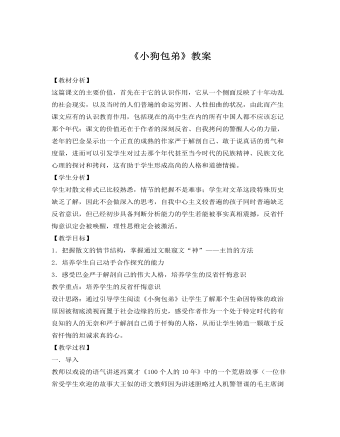
人教版高中语文《小狗包弟》教案
五.课堂总结:巴金是现代中国不多的文学大师、思想家之一,他以丰硕的文学成果以及一生坦荡无瑕圣哲般高贵的人品,向世人证明了爱心的价值、真诚的伟大,以及天才的光芒,这位“20世纪中国的良心”,他的名字必将与鲁迅等人一样,长留青史,像北斗一样在天空闪烁!让我们记住这位老人并学习这位老人的不断进取的精神和严于解剖自己灵魂的勇气,铸造一种坦诚真实的人格。六.课外合作探究:狗与“伤痕文学”巴金此文开篇就写艺术家与狗的故事,然后写自己与狗,不光此篇写狗,他在另外的文章中也写到狗,不光巴金如此,反映文革的“伤痕文学”都经常写到狗,你如何看待这一文学现象?1.学生课外阅读“伤痕文学”查阅相关文学评论(6人一组,4人分组从网上和书籍中查阅相关文章,2人分别查阅相关评论)2.课后教师与学生交流并发表有倾向性的意见:
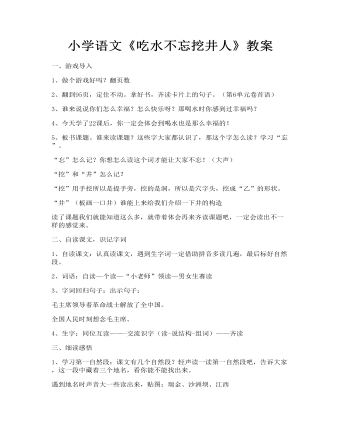
小学语文《吃水不忘挖井人》教案
4、今天学了22课后,你一定会体会到喝水也是那么幸福的!5、板书课题。谁来读课题?这些字大家都认识了,那这个字怎么读?学习“忘”。“忘”怎么记?你想怎么读这个词才能让大家不忘!(大声)“挖”和“井”怎么记?“挖”用手挖所以是提手旁,挖的是洞,所以是穴字头,挖成“乙”的形状。“井”(板画一口井)谁能上来给我们介绍一下井的构造读了课题我们就能知道这么多,就带着体会再来齐读课题吧,一定会读出不一样的感觉来。
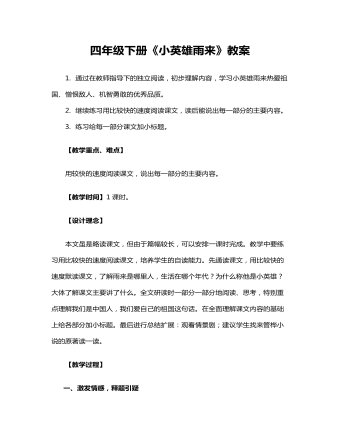
四年级下册《小英雄雨来》教案
1. 通过在教师指导下的独立阅读,初步理解内容,学习小英雄雨来热爱祖国、憎恨敌人、机智勇敢的优秀品质。2. 继续练习用比较快的速度阅读课文,读后能说出每一部分的主要内容。3. 练习给每一部分课文加小标题。【教学重点、难点】用较快的速度阅读课文,说出每一部分的主要内容。【教学时间】1课时。【设计理念】本文虽是略读课文,但由于篇幅较长,可以安排一课时完成。教学中要练习用比较快的速度阅读课文,培养学生的自读能力。先通读课文,用比较快的速度默读课文,了解雨来是哪里人,生活在哪个年代?为什么称他是小英雄?大体了解课文主要讲了什么。全文研读时一部分一部分地阅读、思考,特别重点理解我们是中国人,我们爱自己的祖国这句话。在全面理解课文内容的基础上给各部分加小标题。最后进行总结扩展:观看情景剧;建议学生找来管桦小说的原著读一读。【教学过程】一、激发情感,释题引疑1、课件演示:小雨来与鬼子斗争的片断。问:你们想认识这位小英雄吗?2、出示课题:(1) 理解课题:齐读课题你从中知道了什么?小——指的是雨来的年龄小,是一个少年。英雄——指的“是雨来的特点。雨来——课文中的主人公。课题表现出文章的中心——英雄。(2) 引导到学生质疑:看到课题后,你还想知道什么?(为什么称雨来是小英雄?)(从课文中的哪些地方可以看出雨来是一位小英雄?)
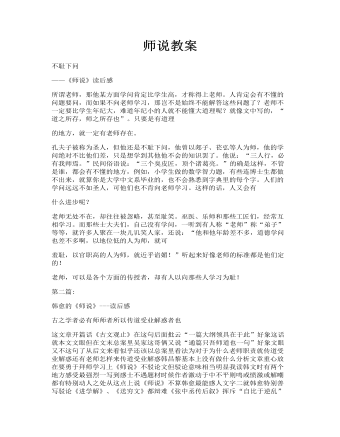
师说教案
孔夫子被称为圣人,但他还是不耻下问,他曾以郯子、苌弘等人为师,他的学问绝对不比他们差,只是想学到其他他不会的知识罢了。他说:“三人行,必有我师焉。”民间俗语说:“三个臭皮匠,顶个诸葛亮。”的确是这样,不管是谁,都会有不懂的地方,例如,小学生做的数学智力题,有些连博士生都做不出来,就算你是大学中文系毕业的,也不会熟悉到字典里的每个字。人们的学问远远不如圣人,可他们也不肯向老师学习。这样的话,人又会有什么进步呢?老师无处不在,却往往被忽略,甚至耻笑。巫医、乐师和那些工匠们,经常互相学习。而那些士大夫们,自己没有学问,一听到有人称“老师”称“弟子”等等,就许多人聚在一块儿讥笑人家,还说:“他和他年龄差不多,道德学问也差不多啊,以地位低的人为师,就可羞耻,以官职高的人为师,就近乎谄媚!”听起来好像老师的标准都是他们定的!老师,可以是各个方面的传授者,却有人以向那些人学习为耻!
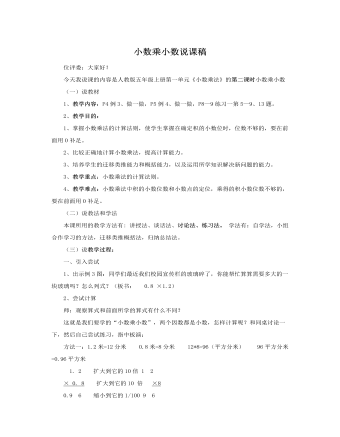
人教版新课标小学数学五年级上册小数乘小数说课稿
各位评委:大家好!今天我说课的内容是人教版五年级上册第一单元《小数乘法》的第二课时小数乘小数(一)说教材1、教学内容:P4例3、做一做,P5例4、做一做,P8—9练习一第5—9、13题。2、教学目的:1、掌握小数乘法的计算法则,使学生掌握在确定积的小数位时,位数不够的,要在前面用0补足。2、比较正确地计算小数乘法,提高计算能力。3、培养学生的迁移类推能力和概括能力,以及运用所学知识解决新问题的能力。3、教学重点:小数乘法的计算法则。4、教学难点:小数乘法中积的小数位数和小数点的定位,乘得的积小数位数不够的,要在前面用0补足。(二)说教法和学法本课所用的教学方法有: 讲授法、谈话法、讨论法、练习法。 学法有:自学法,小组合作学习的方法,迁移类推概括法,归纳总结法。
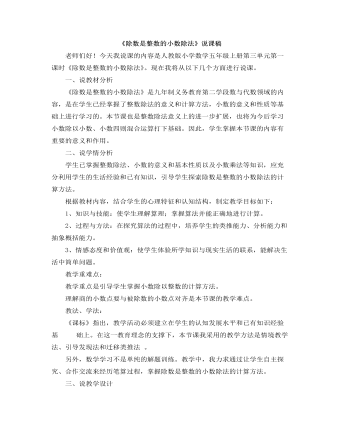
小学数学人教版五年级上册《除数是整数的小数除法》说课稿
一、说教材分析 《除数是整数的小数除法》是九年制义务教育第二学段数与代数领域的内容,是在学生已经掌握了整数除法的意义和计算方法,小数的意义和性质等基础上进行学习的。本节课也是整数除法意义上的进一步扩展,也将为今后学习小数除以小数、小数四则混合运算打下基础。因此,学生掌握本节课的内容有重要的意义和作用。 二、说学情分析学生已掌握整数除法、小数的意义和基本性质以及小数乘法等知识,应充分利用学生的生活经验和已有知识,引导学生探索除数是整数的小数除法的计算方法。 根据教材内容,结合学生的心理特征和认知结构,制定教学目标如下: 1、知识与技能:使学生理解算理;掌握算法并能正确地进行计算。 2、过程与方法:在探究算法的过程中,培养学生的类推能力、分析能力和抽象概括能力。 3、情感态度和价值观:使学生体验所学知识与现实生活的联系,能解决生活中简单问题。
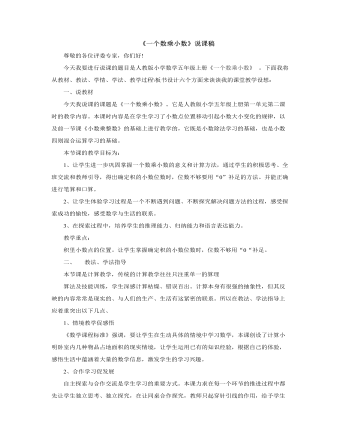
小学数学人教版五年级上册《一个数乘小数》说课稿
一、说教材今天我说课的课题是《一个数乘小数》。它是人教版小学五年级上册第一单元第二课时的教学内容。本课时内容是在学生学习了小数点位置移动引起小数大小变化的规律,以及前一节课《小数乘整数》的基础上进行教学的,它既是小数除法学习的基础,也是小数四则混合运算学习的基础。本节课的教学目标为:1、让学生进一步巩固掌握一个数乘小数的意义和计算方法,通过学生的积极思考、全班交流和教师引导,得出确定积的小数位数时,位数不够要用“0”补足的方法。并能正确进行笔算和口算。2、让学生体验学习过程是一个不断遇到问题、不断探究解决问题方法的过程,感受探索成功的愉悦,感受数学与生活的联系。3、在探索过程中,培养学生的推理能力、归纳能力和语言表达能力。
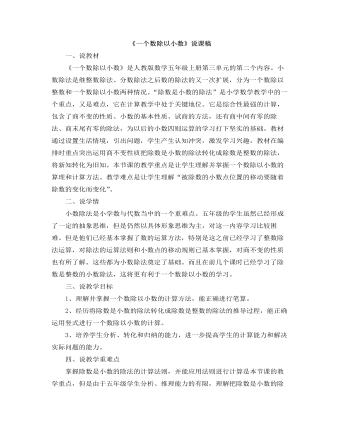
小学数学人教版五年级上册《一个数除以小数》说课稿
一、说教材《一个数除以小数》是人教版数学五年级上册第三单元的第二个内容。小数除法是继整数除法、分数除法之后数的除法的又一次扩展,分为一个数除以整数和一个数除以小数两种情况。“除数是小数的除法”是小学数学教学中的一个重点,又是难点,它在计算教学中处于关键地位。它是综合性最强的计算,包含了商不变的性质、小数的基本性质、试商的方法,还有商中间有零的除法、商末尾有零的除法,为以后的小数四则运算的学习打下坚实的基础。教材通过设置生活情境,引出问题,学生产生认知冲突,激发学习兴趣。教材在编排时重点突出运用商不变性质把除数是小数的除法转化成除数是整数的除法,将新知转化为旧知。本节课的教学重点是让学生理解并掌握一个数除以小数的算理和计算方法。教学难点是让学生理解“被除数的小数点位置的移动要随着除数的变化而变化”。
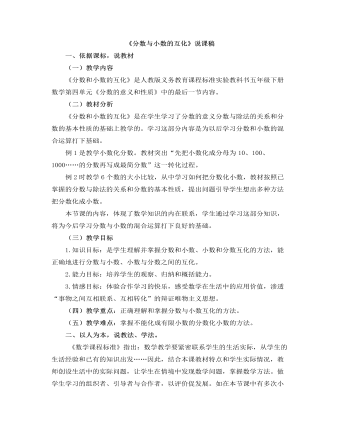
小学数学人教版五年级下册《分数与小数的互化》说课稿
(二)教材分析《分数和小数的互化》是在学生学习了分数的意义分数与除法的关系和分数的基本性质的基础上教学的。学习这部分内容是为以后学习分数和小数的混合运算打下基础。例1是教学小数化分数。教材突出“先把小数化成分母为10、100、1000……的分数再写成最简分数”这一转化过程。例2时教学6个数的大小比较,从中学习如何把分数化小数,教材按照已掌握的分数与除法的关系和分数的基本性质,提出问题引导学生想出多种方法把分数化成小数。本节课的内容,体现了数学知识的内在联系,学生通过学习这部分知识,将为今后学习分数与小数的混合运算打下良好的基础。(三)教学目标1.知识目标:是学生理解并掌握分数和小数、小数和分数互化的方法,能正确地进行分数与小数、小数与分数之间的互化。2.能力目标:培养学生的观察、归纳和概括能力。3.情感目标:体验合作学习的快乐,感受数学在生活中的应用价值,渗透“事物之间互相联系、互相转化”的辩证唯物主义思想。
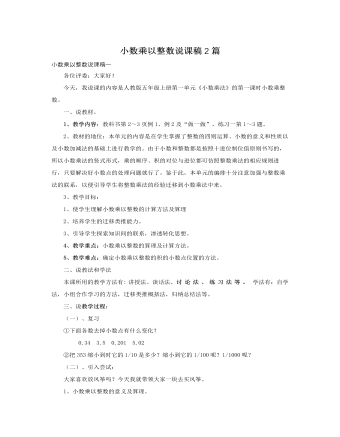
人教版新课标小学数学五年级上册小数乘以整数说课稿2篇
这样充分尊重学生的独立思考的过程与结果,鼓励学生想出多种方法计算,在学生汇报交流、反馈、评价中初步感受到转化的数学思想,获得成功的学习体验,之后教师评价:大家能把新的问题转化成已有的经验来解决,这种分析思考的方法很好,你们还能提出类似的问题吗?进而引入进一步的探索当中,教师作出这样的提示,这道题没有元角分,你们能把它也转化成已经学过的乘法算式吗?在学生独立思考计算的基础上,组织小组讨论,给每个学生展示自己思维的机会,教师深入小组收集信息,然后组织全班讨论,揭示算理,得出计算的方法。这一过程要重点突出算理的探索,使学生认识到小数乘法与整数乘法的联系,利用积变化的规律合理解释算理,通过学生亲身经历,主动参与,积极思考,自学交流等活动过程,使学生真正获得数学的知识和学习方法。
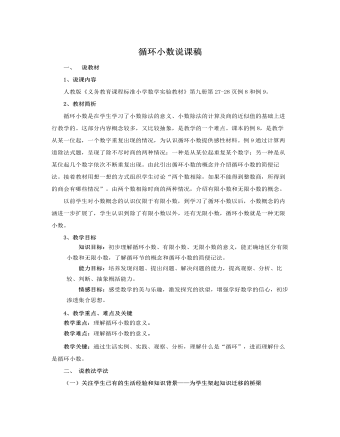
人教版新课标小学数学五年级上册循环小数说课稿
2、教材简析循环小数是在学生学习了小数除法的意义、小数除法的计算及商的近似值的基础上进行教学的。这部分内容概念较多,又比较抽象,是教学的一个难点。课本的例8,是教学从某一位起,一个数字重复出现的情况,为认识循环小数提供感性材料。例9通过计算两道除法式题,呈现了除不尽时商的两种情况:一种是从某位起重复某个数字;另一种是从某位起几个数字依次不断重复出现。由此引出循环小数的概念并介绍循环小数的简便记法。接着教材用想一想的方式组织学生讨论“两个数相除,如果不能得到整数商,所得到的商会有哪些情况”。由两个数相除时商的两种情况,介绍有限小数和无限小数的概念。以前学生对小数概念的认识仅限于有限小数,到学习了循环小数以后,小数概念的内涵进一步扩展了,学生认识到除了有限小数以外,还有无限小数,循环小数就是一种无限小数。
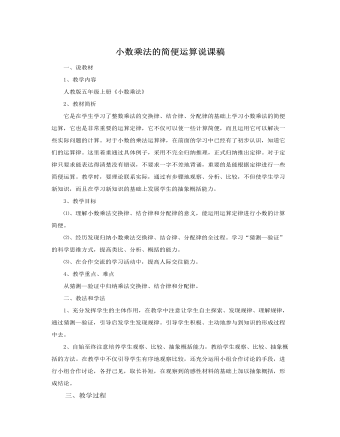
人教版新课标小学数学五年级上册小数乘法的简便运算说课稿
⑴、理解小数乘法交换律、结合律和分配律的意义,能运用运算定律进行小数的计算简便。⑵、经历发现归纳小数乘法交换律、结合律、分配律的全过程。学习“猜测—验证”的科学思维方式,提高类比、分析、概括的能力。⑶、在合作交流的学习活动中,提高人际交往能力。4、教学重点、难点从猜测—验证中归纳乘法交换律、结合律和分配律。二、教法和学法1、充分发挥学生的主体作用,在教学中注意让学生自主探索、发现规律、理解规律,通过猜测—验证,引导启发学生发现规律。引导学生积极、主动地参与到知识的形成过程中去。2、自始至终注意培养学生观察、比较、抽象概括能力,教给学生观察、比较、抽象概括的方法。在教学中不仅引导学生有序地观察比较,还充分运用小组合作讨论的手段,进行小组合作讨论,各抒己见,取长补短,在观察到的感性材料的基础上加以抽象概括,形成结论。

